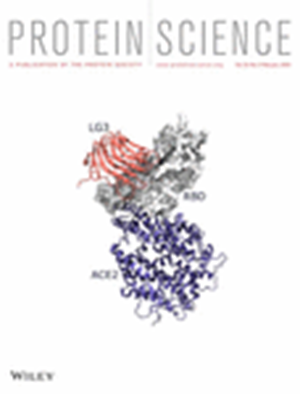Benchmarking reverse docking through AlphaFold2 human proteome
IF 4.5
3区 生物学
Q1 BIOCHEMISTRY & MOLECULAR BIOLOGY
引用次数: 0
Abstract
Predicting the binding of ligands to the human proteome via reverse‐docking methods enables the understanding of ligand's interactions with potential protein targets in the human body, thereby facilitating drug repositioning and the evaluation of potential off‐target effects or toxic side effects of drugs. In this study, we constructed 11 reverse docking pipelines by integrating site prediction tools (PointSite and SiteMap), docking programs (Glide and AutoDock Vina), and scoring functions (Glide, Autodock Vina, RTMScore, DeepRMSD, and OnionNet‐SFCT), and then thoroughly benchmarked their predictive capabilities. The results show that the Glide_SFCT (PS) pipeline exhibited the best target prediction performance based on the atomic structure models in AlphaFold2 human proteome. It achieved a success rate of 27.8% when considering the top 100 ranked prediction. This pipeline effectively narrows the range of potential targets within the human proteome, laying a foundation for drug target prediction, off‐target assessment, and toxicity prediction, ultimately boosting drug development. By facilitating these critical aspects of drug discovery and development, our work has the potential to ultimately accelerate the identification of new therapeutic agents and improve drug safety.通过 AlphaFold2 人类蛋白质组进行反向对接基准测试
通过反向对接方法预测配体与人体蛋白质组的结合,可以了解配体与人体内潜在蛋白质靶点的相互作用,从而有助于药物的重新定位和评估药物潜在的脱靶效应或毒副作用。在这项研究中,我们整合了位点预测工具(PointSite 和 SiteMap)、对接程序(Glide 和 AutoDock Vina)和评分函数(Glide、Autodock Vina、RTMScore、DeepRMSD 和 OnionNet-SFCT),构建了 11 个反向对接管道,然后对它们的预测能力进行了全面的基准测试。结果表明,基于 AlphaFold2 人类蛋白质组的原子结构模型,Glide_SFCT(PS)管道的目标预测性能最佳。考虑到排名前 100 位的预测,它的成功率达到了 27.8%。该管道有效缩小了人类蛋白质组中潜在靶点的范围,为药物靶点预测、脱靶评估和毒性预测奠定了基础,最终促进了药物开发。通过促进药物发现和开发的这些关键环节,我们的工作有可能最终加快新治疗药物的鉴定并提高药物安全性。
本文章由计算机程序翻译,如有差异,请以英文原文为准。
求助全文
约1分钟内获得全文
求助全文
来源期刊

Protein Science
生物-生化与分子生物学
CiteScore
12.40
自引率
1.20%
发文量
246
审稿时长
1 months
期刊介绍:
Protein Science, the flagship journal of The Protein Society, is a publication that focuses on advancing fundamental knowledge in the field of protein molecules. The journal welcomes original reports and review articles that contribute to our understanding of protein function, structure, folding, design, and evolution.
Additionally, Protein Science encourages papers that explore the applications of protein science in various areas such as therapeutics, protein-based biomaterials, bionanotechnology, synthetic biology, and bioelectronics.
The journal accepts manuscript submissions in any suitable format for review, with the requirement of converting the manuscript to journal-style format only upon acceptance for publication.
Protein Science is indexed and abstracted in numerous databases, including the Agricultural & Environmental Science Database (ProQuest), Biological Science Database (ProQuest), CAS: Chemical Abstracts Service (ACS), Embase (Elsevier), Health & Medical Collection (ProQuest), Health Research Premium Collection (ProQuest), Materials Science & Engineering Database (ProQuest), MEDLINE/PubMed (NLM), Natural Science Collection (ProQuest), and SciTech Premium Collection (ProQuest).
 求助内容:
求助内容: 应助结果提醒方式:
应助结果提醒方式:


